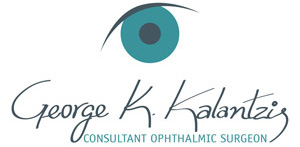Age macular degeneration
Age-related macular degeneration (AMD) is the number one cause of legal blindness in people over the age of 55 in the UK. The macula, the central area of retina responsible for reading and detailed vision, is particularly susceptible to degeneration as we age. Although mild AMD causes few symptoms, progression leads to devastating central visual loss, limiting a person’s ability to read, recognise faces and drive.
There are two forms of AMD – Wet and Dry.
Wet AMD: About 10% of people with AMD develop the wet form of the disease. This happens when abnormal blood vessels develop in the eye wall beneath the macula. Untreated, leakage of fluid and blood causes rapid deterioration of sight leading to permanent scarring. Early detection offers hope of treatment to control the disease process before too much damage is done. With time, leakage stops and a dry scar remains. Both Laser and injections into the eye of Avastin or Lucentis can help early on.
Dry AMD: About 90% of people with AMD have the dry form of the disease. This is simply wear and tear, with no abnormal blood vessels present. Traditionally, there has been no effective means of improving vision for this overwhelming majority of sufferers apart from some benefit from magnification aids or magnifying glasses.
For all types of macular change, stopping smoking can help.
Can diet affect my vision?
Over recent years a lot of good quality research has led us to conclude that what we eat can indeed affect our eyesight. Exciting results came from the Age-Related Eye Disease Study (AREDS) which found that a combination of vitamin C (500mg), vitamin E (400 IU), betacarotene (15mg) and zinc (80mg) with cupric oxide (2mg) was able to reduce the risk of disease progression in patients with intermediate or advanced macular degeneration by 22% over a 5 year period. Antioxidants such as lutein and zeaxanthin, and other nutrients such as omega-3 fatty acids are probably beneficial as well.
Antioxidants, which are found in fruits, vegetables, nuts and grains may slow the progression or development of macular degeneration. Lutein and Zeaxanthin are plant pigments and are of particular interest as they have the ability to filter damaging rays of blue light as well as acting as scavengers of free radicals which can damage the macula. Lutein and Zeaxanthin are found in kale, spinach and other dark green leafy vegetables and orange fruit and vegetables. Inflammation appears to have causative role in the development of AMD and Omega-3 fatty acids have a protective role as they help reduce inflammation and promote proper blood vessel formation. Omega-3 is found in fish.
It should be noted that some other studies have shown a negative effect with regard the increased intake of certain vitamins. An Italian study showed an increased rate of posterior cataract formation with multivitamins – this needs to be confirmed by other research studies. Increased intake of betacarotene is associated with a higher rate of lung cancer in smokers. Higher levels of vitamin E (800 IU) may increase heart failure in people with vascular disease or diabetes although the levels of 400 IU.
So what should you do? A healthy balanced diet is recommended – low in saturated fats, rich in fruits, vegetables, wholegrain and fish. You should not smoke. Supplementary vitamin tablets for ‘eye health’ can be used if your AMD is intermediate or advanced as they have been shown to reduce progression and may slow any development in the other eye as well. Ocuvite has the vitamin formula used in the AREDS trial and others such as Visionace Plus and Nutrof Total have different vitamin levels and include other antioxidants such as lutein, zeaxanthin, bilberry and polyphenols whose effect is theoretically beneficial on the progression of AMD, but possible side-effects need to be further studied. It is unknown if these supplements are better than changing ones diet alone.



